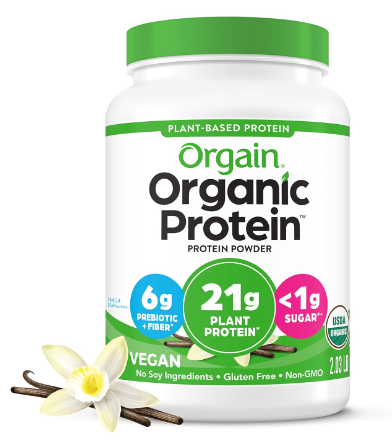Best protein powder for seniors is a topic of growing interest as the population ages and the importance of maintaining muscle mass and overall health becomes more widely recognized. Protein is a critical nutrient for seniors, as it helps to preserve muscle mass, which can decline with age, leading to decreased mobility and independence. Protein powder supplementation offers a convenient and efficient way to increase protein intake, particularly for those who may struggle with consuming enough protein through their diet alone.
This article will delve into the various types of protein powders available, their benefits, and how to select the best protein powder for seniors to support their health and well-being.
Table of Contents
Key Takeaways on the Best Protein Powder for Seniors
Diverse Options for Individual Needs: The best protein powder for seniors comes in various forms, including whey protein isolate, plant-based options, and collagen protein powders, catering to different dietary preferences and health requirements.
- Whey Protein Isolate for Muscle Maintenance: Whey protein isolate stands out for its high bioavailability and effectiveness in preserving muscle mass, making it an excellent choice for seniors focused on maintaining strength and physical function.
- Plant-Based Proteins for Dietary Restrictions: For seniors with dairy intolerances or those following a vegetarian or vegan lifestyle, plant-based protein powders offer a comprehensive and nutritious alternative, providing essential amino acids and additional health benefits.
- Collagen Protein for Joint and Skin Health: Collagen protein powders target specific senior health concerns such as joint health and skin elasticity, offering a specialized supplement option that complements other protein sources.
- Considerations for Selection: When choosing the best protein powder, seniors should consider factors such as digestibility, nutritional content, and any specific health goals or dietary restrictions they may have.
- Holistic Approach to Health: Incorporating the right protein powder into a senior’s diet is a step towards supporting a holistic approach to health, contributing to improved muscle mass, bone density, and overall vitality in later years.
Understanding Protein Needs for Seniors
The best protein powder for seniors is a topic of increasing interest as the population ages and more individuals seek ways to maintain their health and vitality into their later years. Understanding the specific nutritional needs of seniors is crucial in selecting the right protein supplement that supports their overall well-being and helps them lead an active lifestyle. Here, we delve into the reasons why seniors need more protein, the role of protein in maintaining muscle mass and overall health, and the factors that may affect protein requirements in seniors.
Why seniors need more protein
- Increased Muscle Mass Preservation: As individuals age, they naturally begin to lose muscle mass, a condition known as sarcopenia. The best protein powder for seniors can help counteract this effect by providing the essential amino acids needed for muscle repair and growth.
- Enhanced Recovery: Seniors often experience longer recovery times from injuries and illnesses. Adequate protein intake supports the body’s healing processes, making recovery quicker and more efficient.
- Improved Metabolic Rate: With age, the metabolic rate tends to slow down. Consuming sufficient protein can help maintain a healthy metabolism, aiding in weight management and energy levels.
- Support for Bone Health: Protein plays a significant role in maintaining bone density and strength, reducing the risk of osteoporosis and fractures, which are common concerns for seniors.
The role of protein in maintaining muscle mass and overall health
- Prevention of Sarcopenia: Regular intake of high-quality protein helps in slowing down the rate of muscle loss due to aging, thereby preserving strength and mobility.
- Supports Immune Function: Protein is vital for the production of antibodies and immune system cells. The best protein powder for seniors can bolster their immune response, protecting them from various illnesses.
- Aids in Weight Management: Protein has a higher thermic effect compared to fats and carbohydrates, meaning its digestion burns more calories. This, coupled with its satiating effect, can help seniors manage their weight more effectively.
- Enhances Functional Abilities: Adequate protein intake is associated with improved muscle function, which is crucial for daily activities and maintaining independence in seniors.
Factors that may affect protein requirements in seniors
- Activity Level: Seniors who are more active may require more protein to support muscle repair and growth. The best protein powder for seniors should cater to their specific activity levels.
- Health Conditions: Certain health conditions, such as chronic kidney disease, may necessitate adjustments in protein intake. It’s important to choose a protein powder that aligns with any medical dietary restrictions.
- Nutritional Absorption: As digestion and absorption can become less efficient with age, seniors might need protein powders that are easily digestible and highly bioavailable.
- Dietary Preferences: Vegetarian or vegan seniors may need protein powders that provide a complete amino acid profile, typically found in animal proteins, to meet their nutritional needs.
The best protein powder for seniors is one that not only meets their increased protein requirements but also supports their muscle mass, overall health, and accommodates any specific dietary needs or health conditions. By understanding these key points, seniors can make informed choices about their protein supplementation, ensuring they remain active and healthy in their later years.
Benefits of Protein Powder for Seniors
As the body’s ability to process nutrients changes, finding the right type of protein supplement can make a significant difference in a senior’s nutritional intake. This section of the article delves into the benefits of protein powder for seniors, highlighting why it’s a crucial component of a healthy aging diet;
(a) Convenient source of high-quality protein for seniors
- High Protein Content: The best protein powder for seniors offers a concentrated source of high-quality protein, which is essential for repairing tissues, maintaining muscle mass, and supporting overall health. This is particularly important as seniors often require more protein than younger adults to maintain muscle mass and function.
- Ease of Use: Protein powders can be easily added to a variety of foods and beverages, making it simple for seniors to increase their protein intake without having to eat large quantities of food.
- Nutrient-Rich: Many protein powders are fortified with vitamins and minerals, providing seniors with a nutrient-dense supplement that supports their daily nutritional needs.
(b) Easy to digest for aging digestive systems: best protein powder for seniors
- Gentle on the Stomach: As digestion can become less efficient with age, the best protein powder for seniors is designed to be easy to digest, reducing the risk of gastrointestinal discomfort.
- Rapid Absorption: Whey protein, in particular, is known for its rapid absorption rate, making it an excellent option for seniors who need to efficiently utilize protein for muscle repair and growth.
- Low in Lactose: Many high-quality senior-specific protein powders are low in lactose or lactose-free, catering to those with lactose intolerance or sensitivity.
(c) Versatility in incorporating into daily routines for seniors
– Diverse Usage: The best protein powder for seniors can be incorporated into a wide range of foods, from smoothies and shakes to soups and baked goods, ensuring seniors can enjoy their favorite foods while getting the protein they need.
– Flavor Options: With a variety of flavors available, seniors can choose protein powders that suit their taste preferences, making it more likely they’ll consistently incorporate them into their diet.
– Meal Replacement: For seniors with reduced appetite, protein shakes can serve as a nutritious meal replacement, providing essential nutrients in an easily consumable form.
(d) Potential for aiding in muscle recovery and maintenance for seniors
- Supports Muscle Health: Regular consumption of protein powder can help seniors maintain muscle mass, which is crucial for mobility, strength, and independence.
- Aids in Recovery: Protein is vital for the repair of muscle tissue damaged during physical activity. The best protein powder for seniors can help speed up recovery times, allowing for more consistent engagement in physical exercise.
- Prevents Sarcopenia: Adequate protein intake is key in preventing sarcopenia, the age-related loss of muscle mass and strength. Protein supplements can play a significant role in this preventive strategy.
The best protein powder for seniors offers a convenient, digestible, and versatile option for meeting the increased protein needs associated with aging. By supporting muscle recovery and maintenance, these supplements can significantly contribute to a senior’s quality of life, helping them stay active, independent, and healthy.
Factors to Consider When Choosing Protein Powder for Seniors
Choosing the best protein powder for seniors involves considering various factors to ensure that the supplement not only meets their nutritional needs but also aligns with their health goals, dietary restrictions, and personal preferences. Here, we delve into the essential aspects seniors should evaluate when selecting a protein powder as the best protein powder for seniors;
(a) Protein Content and Quality
- High Biological Value: Opt for protein powders with a high biological value, indicating that the protein contains all essential amino acids in adequate amounts for the body’s use. Whey and soy protein are excellent examples.
- Complete vs. Incomplete Proteins: Seniors should choose complete proteins that provide all essential amino acids. Plant-based seniors might need to look for blends, like pea and rice protein, to ensure they’re getting a complete amino acid profile.
- Amount Per Serving: The protein powder should offer a substantial amount of protein per serving, ideally between 20 to 30 grams, to support muscle maintenance and overall health.
(b) Digestibility and Ease of Absorption
- Digestive Enzymes: Some protein powders are fortified with digestive enzymes to enhance absorption, particularly beneficial for seniors with digestive issues.
- Hydrolyzed Proteins: Hydrolyzed protein powders, which are partially broken down, can be more easily absorbed by the body, making them a good option for seniors.
- Consideration of Lactose Intolerance: Whey protein isolates are preferable for those with lactose intolerance as they contain less lactose than concentrates.
(c) Added Ingredients and Potential Allergens
- Avoid Unnecessary Additives: Look for protein powders with minimal added sugars, artificial flavors, and fillers. These can be unnecessary and potentially harmful.
- Allergen-Free Options: Seniors with food allergies or sensitivities should opt for hypoallergenic protein powders, such as pea, rice, or hemp protein, which are generally free from common allergens like dairy, soy, and gluten.
- Nutrient Fortification: Some protein powders are fortified with vitamins and minerals, such as calcium and vitamin D, which can be particularly beneficial for seniors.
(d) Taste and Texture Preferences
- Flavor Variety: A wide range of flavors ensures that seniors can choose one that appeals to their taste preferences, making it more likely they will consistently use the protein powder.
- Texture: The powder should mix well without clumping, offering a smooth texture that is easy to consume, whether mixed with water, milk, or added to smoothies.
(e) Cost-effectiveness and Value for Money
- Price Per Serving: Evaluate the cost per serving rather than just the upfront price of the protein powder container. Higher-priced options might offer better quality or more servings.
- Bulk Purchasing: Some brands offer discounts for bulk purchases, which can be cost-effective for seniors who use protein powder regularly.
- Quality vs. Price: While it’s important to find an affordable option, seniors shouldn’t compromise on quality. Higher-quality proteins with fewer additives might be slightly more expensive but offer better health benefits.
The best protein powder for seniors should provide high-quality, complete protein in a digestible form, free from unnecessary additives and allergens, and cater to their taste and texture preferences, all while offering good value for money. By considering these factors, seniors can find a protein powder that supports their health and wellness goals effectively.
Top Protein Powders Recommended for Seniors: The Best Protein Powder for Seniors
When searching for the best protein powder for seniors, it’s crucial to consider various factors such as dietary restrictions, health goals, and personal preferences. Protein supplements can play a significant role in maintaining muscle mass, supporting bone health, and ensuring overall well-being for older adults. Here, we delve into the top protein powders recommended for seniors, highlighting their benefits, considerations, and some recommended brands and products.
1. Whey Protein Isolate
Whey Protein Isolate is often touted as one of the best protein powder for seniors due to its high protein content and low lactose levels.
Benefits and considerations
– High in essential amino acids, particularly leucine, which is crucial for muscle protein synthesis.
– Fast-absorbing, making it ideal for post-workout recovery.
– Some seniors may have lactose intolerance or sensitivity to dairy, making whey protein isolate a better option than concentrates due to its lower lactose content.
Recommended brands and products

(i) Optimum Nutrition Gold Standard 100% Whey Protein Isolate offers a high-quality, easily digestible protein source.


(ii) Isopure Zero Carb Protein Powder, which is lactose-free and offers a high protein content per serving.
2. Plant-Based Protein Powders
For seniors following a vegetarian or vegan diet, plant-based protein powders provide an excellent alternative to dairy-based proteins.
Benefits and considerations
– Typically includes proteins derived from peas, brown rice, hemp, or soy, offering a complete amino acid profile when combined properly.
– Rich in fiber and other nutrients beneficial for heart health and digestion.
– Some plant-based proteins may have a grittier texture or less appealing taste compared to whey proteins, which can be mitigated by blending with fruits or using flavored versions.
Recommended brands and products

(i) Vega One All-In-One Plant Based Protein Powder, which includes a blend of pea, hemp, and flaxseed proteins along with additional vitamins and minerals.

(ii) Orgain Organic Plant Based Protein Powder, known for its smooth texture and variety of flavors.
3. Collagen Protein Powders
Collagen protein powders are gaining popularity among seniors for their potential benefits beyond muscle maintenance, including supporting joint health and skin elasticity.
Benefits and considerations
– Rich in amino acids proline and glycine, which are essential for collagen production in the body, supporting skin, hair, nails, and joint health.
– Not a complete protein source, so it should be used in conjunction with other protein sources to ensure a balanced amino acid intake.
– Derived from animal sources, so it may not be suitable for vegetarians or vegans.
Recommended brands and products

(i) Vital Proteins Collagen Peptides, which is easily dissolvable and can be added to hot or cold beverages.

(ii) NeoCell Super Collagen Powder, offering high-quality collagen peptides that support bone and joint health.
The best protein powder for seniors depends on individual health goals, dietary preferences, and any specific health considerations. Whether opting for whey protein isolate, plant-based protein, or collagen protein powders, it’s essential to choose high-quality products from reputable brands. Seniors should also consider consulting with a healthcare provider or a nutritionist to tailor their protein supplementation to their unique nutritional needs, ensuring they support their health and wellness effectively as they age.
Tips for Incorporating Protein Powder into a Senior’s Diet
Finding the best protein powder for seniors is essential for maintaining muscle mass, supporting bone health, and ensuring overall nutritional well-being as we age. Protein powders can be a convenient way to supplement dietary protein intake, especially for those who may struggle with consuming enough protein through their diet alone. Below, we provide detailed tips for incorporating protein powder into a senior’s diet, ensuring that the keyphrase ‘best protein powder for seniors’ is optimized for Google search.
Mixing Protein Powder with Various Liquids for Seniors
When it comes to the best protein powder for seniors, versatility is key. Here are some suggestions for mixing protein powder with various liquids:
- Water: Mixing protein powder with water is the simplest way to consume it. It’s quick, easy, and hydrates the body simultaneously. For seniors who prefer a no-fuss approach, this method is ideal.
- Milk: Combining protein powder with milk can enhance the taste and add extra calcium and vitamin D to the diet, which are crucial for bone health in seniors.
- Smoothies: Smoothies are an excellent way to incorporate fruits, vegetables, and protein powder into a senior’s diet. They are easy to consume, especially for those with dental issues, and can be customized to include a variety of nutrients.
- Other Liquids: Protein powder can also be mixed with almond milk, soy milk, or juice for those with dietary restrictions or preferences. These alternatives can provide additional flavors and nutrients.
Ideas for Adding Best Protein Powder for Seniors to Meals and Snacks
The best protein powder for seniors can be seamlessly added to meals and snacks throughout the day. Here are some creative ideas:
- Oatmeal: Stirring protein powder into oatmeal is an excellent way to start the day with a protein boost.
- Soups and Stews: Protein powder can be mixed into soups and stews to increase their protein content without altering the taste significantly.
- Baked Goods: Adding protein powder to recipes for muffins, pancakes, or bread can enhance the nutritional profile of these comfort foods.
- Yogurt and Pudding: Mixing protein powder into yogurt or pudding can make for a delicious and protein-rich dessert or snack.
Guidance on Protein Powder Portion Sizes and Timing of Consumption for Seniors
Proper portion sizes and timing are crucial when adding the best protein powder for seniors into their diet:
- Portion Sizes: Seniors should aim for a protein intake of about 1.0-1.2 grams per kilogram of body weight per day. A typical serving of protein powder is around 20-30 grams of protein, which can help meet these needs.
- Timing of Consumption: Distributing protein intake evenly throughout the day can help with muscle protein synthesis. Including protein powder in breakfast can kickstart the day’s nutrition, while post-exercise consumption can aid in recovery.
- Consultation with Healthcare Providers: It’s important for seniors to consult with healthcare providers to determine the appropriate portion sizes and timing based on individual health needs and dietary restrictions.
Frequently Asked Questions on Best Protein Powder for Seniors
(A) What is the best type of protein powder for seniors to maintain muscle mass?
– Whey protein isolate is often recommended for seniors looking to maintain muscle mass due to its high-quality protein content and easy digestibility. It provides all the essential amino acids needed for muscle maintenance and is quickly absorbed by the body, making it ideal for post-workout recovery.
(B) How much protein do seniors need daily?
– The recommended dietary allowance for older adults is about 1.0-1.2 grams of protein per kilogram of body weight per day. For a senior weighing 70 kg, this equates to 70-84 grams of protein daily. These requirements can vary based on health status and activity level.
(C) Are there any risks associated with protein powder for seniors?
– While protein powders are generally safe, overconsumption can lead to digestive issues, and in rare cases, kidney problems. Seniors with pre-existing health conditions should consult a healthcare professional before starting any new supplement to ensure it aligns with their health needs.
(D) Can protein powder help seniors with weight management?
– Yes, protein powder can be an effective tool for weight management in seniors. High-quality protein supplements that are low in calories and high in protein, such as whey protein isolate, casein protein, and soy protein, can support weight loss efforts by providing a feeling of fullness and preserving lean muscle mass during calorie restriction.
(E) What should seniors look for when choosing a protein powder?
– Seniors should look for protein powders with a high protein content, minimal ingredients, and easy digestibility. It’s also important to avoid artificial sweeteners if possible to reduce the risk of gastrointestinal distress. Additionally, seniors should consider the taste and texture of the protein powder, as well as any dietary restrictions they may have, such as lactose intolerance or a vegetarian/vegan lifestyle. Consulting with a healthcare provider or a registered dietitian can also help tailor the choice to the individual’s specific health needs.
Conclusion
Best protein powder for seniors is a crucial consideration for maintaining health, muscle mass, and overall well-being in later years. Through careful selection among whey protein isolate, plant-based protein powders, and collagen protein powders, seniors can find a supplement that not only meets their nutritional needs but also supports their lifestyle and health goals. Whether the priority is muscle maintenance, dietary restrictions, or specific health benefits like joint support and skin elasticity, there is a protein powder suited to every senior’s needs. Ultimately, incorporating the right protein powder into one’s diet can significantly contribute to a more vibrant, active, and healthy life during the golden years.






Pingback: Choosing the Best Video Games for Seniors: Top 10 for Elders